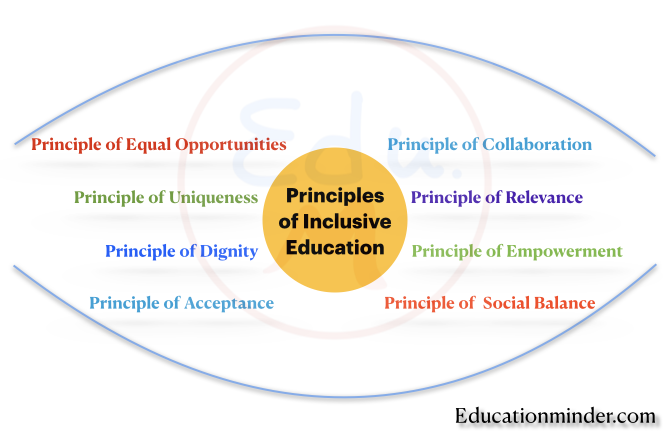Inclusive education focuses on creating an environment where everyone is able to learn, participate, and thrive. It ensures the involvement of children with special needs (CWSN) in the common classroom with normal children.
In this article, we are going to discuss with you the nature and principles of inclusive education.
Nature of Inclusive Education
Following are some points which help you to know about the nature of inclusive education:
1. It provides equal opportunities to all the learners.
2. It promotes all round development of the learners.
3. It is constructive in nature.
4. It is a need based education.
5. It promotes universalisation of education
6. It creates a safe and inclusive environment for all learners.
7. It provides least restrictive and positive learning environment to all children.
Daily use English Speaking Sentences for Teachers:Buy e-book
Principles of Inclusive Education
Following are the 8 principles of inclusive education:
1. Principle of Equal Opportunities
It should follow the principle of equal opportunities. Every child, regardless of race, gender, disability or socio-economic status, should be able to access equal educational opportunities.
There are number of ways to achieve it. One approach is to make sure that all students have access to the same type of materials and resources.
2. Principle of Uniqueness
Inclusive education is based on the principle that every student is unique and has their own strengths and weaknesses. It is the duty of the teacher to enhance the strengths of students and try every possible way to remove their weaknesses.
3. Principle of Dignity
The principle of dignity in education is based on the belief that all students have the right to be treated with respect and to be provided with an education that recognises and respects their abilities and potential.
4. Principle of Acceptance
The principle of acceptance in inclusive education is based on the idea that the disabled learners should be welcomed and encouraged to participate fully in the educational process. It is important to learn and thrive in school.
5. Principle of Collaboration
Inclusive education is based on the principle of collaboration. Teachers should create enough opportunities for students to work collaboratively in an inclusive classroom.
When students work collaboratively, they learn together, solve problems, and share feelings with each other.
6. Principle of Relevance
This principle holds that teachers should select content that is relevant to students. Some students learn by observing and some by experiencing things. So it’s important for teachers to know their students while selecting the relevant content.
7. Principle of Empowerment
Empowerment is a key principle of inclusive education. Disabled learners often have a better understanding of their strengths and weaknesses. This understanding can help disabled children to develop their own personal empowerment.
It can help them to feel proud of themselves and to develop confidence in their abilities. Thus empowerment means providing students with the resources they need to realise their full potential.
8. Principle of Social Balance
It is based on the principle of social balance. To live and thrive in society, social balance is essential. It provides equality in the classroom by removing all kinds of prejudice and discrimination among students.
Related article:
FAQ
How principles of inclusive education enhance learning?
Organizations should follow all the above principles to make the process of teaching and learning inclusive. The principles of inclusive education enhance learning by providing equal educational opportunities and by removing all barriers that hinder students’ ability to learn and develop.














0 Comments